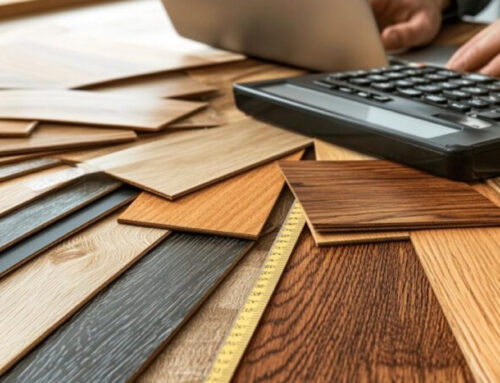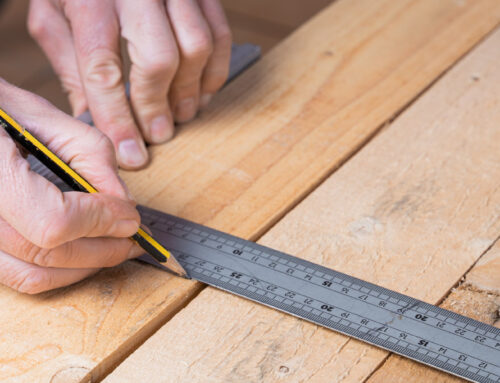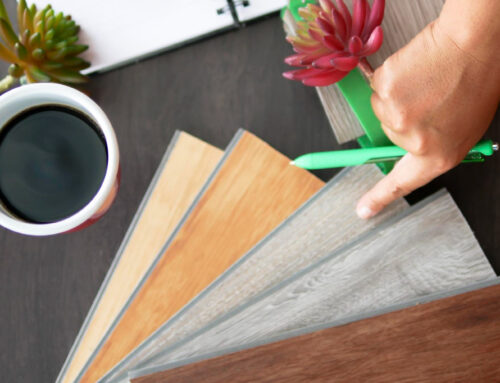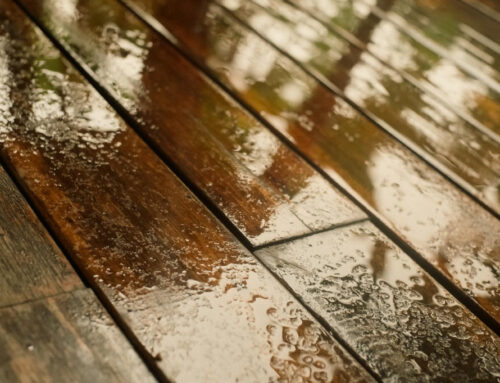DIY cleaners save 50 to 75% using pantry ingredients like vinegar and dish soap. They work great for weekly maintenance, but need careful pH control to avoid finish damage. Store-bought cleaners offer convenience, pH-balanced formulas, and better performance on tough stains. The best hardwood floor cleaner depends on your floor’s age, finish type, and cleaning frequency. Use DIY for routine cleaning on newer floors. Choose commercial products for older floors, heavy soil, or extra protection.
Hardwood floors add beauty and value to homes, but require proper care to maintain their appearance and longevity. Poor cleaning choices cause dullness, residue buildup, finish damage, and premature wear, costing thousands in refinishing or replacement.
Did you know that using the wrong cleaner just once can strip protective finishes that took professional installers hours to apply? This potentially voids warranties on newer floors.
The debate between DIY and store-bought cleaners centers on effectiveness, safety, and value. Homeowners face confusing options from viral Pinterest recipes to premium commercial products. Understanding what actually works protects your investment while keeping floors looking their best.
Your choice matters because hardwood floor finishes react differently to various pH levels, moisture amounts, and chemical ingredients. What works safely on one floor might damage another.
Benefits of DIY Hardwood Floor Cleaners
DIY hardwood floor cleaners save 50 to 75% compared to commercial products while using common household ingredients. Most effective recipes require just three to five pantry staples you already own.
Cost savings add up fast. A gallon of DIY cleaner costs $0.50 to $2.00 versus $8.00 to $15.00 for store-bought equivalents. For households that clean weekly, DIY solutions save $75 to $150 annually.
Budget-Friendly Ingredients
Common DIY cleaner ingredients include:
- White vinegar: Natural acid cuts through dirt and grime. Costs $3.00 per gallon
- Dish soap: Gentle surfactant lifts surface debris without harsh chemicals. Costs $4.00 per 24 ounces
- Olive oil or jojoba oil: Adds subtle shine and conditions wood. Costs $6.00 per 16 ounces
- Essential oils: Provide a pleasant scent and natural antibacterial properties. Costs $8.00 per ounce
- Rubbing alcohol: Quick-drying solvent removes sticky residue. Costs $2.50 per 16 ounces
Customization Options
DIY cleaners let you control every ingredient. Choose your preferred scent with lavender, lemon, or tea tree essential oils. Adjust cleaning strength for different dirt levels. Skip ingredients causing allergic reactions or irritation.
You decide the environmental impact. Use only plant-based, biodegradable ingredients. Eliminate synthetic fragrances, dyes, and preservatives. Reduce plastic waste by reusing spray bottles indefinitely.
Quick DIY Recipes Worth Trying
- Basic daily cleaner: Mix 1 cup water, 1 cup white vinegar, and 10 drops essential oil in a spray bottle. Mist lightly and wipe with a microfiber mop. Perfect for routine maintenance.
- Deep cleaning formula: Combine 1 gallon of warm water, 1/4 cup white vinegar, 1 tablespoon dish soap, and 10 drops lemon essential oil. Damp mop using well well-wrung cloth. Tackles dirt buildup and sticky spots.
- Shine restoring blend: Mix 1/2 cup water, 1/2 cup white vinegar, 1/2 cup rubbing alcohol, and 3 drops jojoba oil. Spray sparingly and buff with a clean microfiber cloth. Brings back luster on dull floors.
Pro Tip:
Always test DIY cleaners in an inconspicuous area first. Wait 24 hours to check for any adverse reactions like cloudiness, stickiness, or finish damage before using on your entire floor.
Store Bought Cleaners: What Do They Offer?
Store-bought hardwood floor cleaners provide convenience, scientifically formulated pH balance, and specialized solutions for specific floor types and problems. These products undergo extensive testing, ensuring compatibility with various finishes.
Commercial cleaners save time. No measuring or mixing required. Grab the bottle, spray or pour, and clean. Consistent formulation guarantees predictable results every time.
Convenience Factor
Store-bought cleaners come ready to use. Most feature easy application methods like spray bottles, squeeze and mop systems, or concentrated formulas you simply add to water. Pre-measured doses eliminate guesswork.
Specialized products target specific needs. Find cleaners for high gloss polyurethane, matte oil finishes, engineered wood, or site-finished floors. Manufacturers engineer formulas matching exact pH requirements for each finish type.
Brand Reliability
Established brands invest millions in research and development. They test products on various wood species and finish types. Quality manufacturers provide clear usage instructions, safety data, and customer support.
Reputable brands stand behind their products with satisfaction guarantees. If a cleaner damages your floor when used correctly, companies often cover repair costs or replacement expenses.
Top performing brands include Bona, Method, Murphy Oil Soap, Rejuvenate, and Bruce. These companies maintain consistent quality across production runs and clearly label ingredients.
Safety Certifications
Many commercial cleaners carry certifications indicating safety for specific groups:
- EPA Safer Choice: Meets stringent environmental and health standards
- Green Seal Certified: Independently verified environmental claims
- Leaping Bunny: Confirms no animal testing
- Hypoallergenic certification: Formulated without common allergens
- Pet safe designation: Non-toxic if accidentally ingested by animals
Families with young children, pets, or allergy sufferers benefit from certified products. These cleaners undergo independent testing verifying safety claims beyond manufacturer promises.
Ever wonder which hardwood cleaner gives you the best value? The best hardwood floor cleaner for your home might not be the most expensive option. Mid-priced products often perform identically to premium brands in independent testing.
Comparing Effectiveness: DIY vs. Store-Bought
Both DIY and commercial cleaners effectively remove everyday dirt and maintain hardwood floors when used correctly. Performance differences emerge with specific challenges like heavy soil, stubborn stains, or protecting vulnerable finishes.
Real-world effectiveness depends on floor condition, finish type, soil level, and user technique more than cleaner choice alone.
Which Cleans Better: DIY or Commercial Formulas?
For routine maintenance on moderately soiled floors, DIY and store-bought cleaners perform equally well. Independent testing shows properly formulated homemade solutions clean as effectively as mid-priced commercial products for everyday dirt.
DIY cleaners excel at light soil removal. The vinegar and water combination cuts through surface dust, light dirt, and minor sticky spots. Simple formulas work great for weekly cleaning schedules on floors without heavy traffic.
Store-bought cleaners outperform DIY formulas in several situations:
- Heavy soil and grease buildup: Commercial surfactant systems lift embedded dirt better than simple vinegar solutions
- Streak-free finishing: Professional formulas dry without residue or cloudiness
- Consistent results: Pre-measured concentrations eliminate under- or over-dilution problems
- Multi-surface compatibility: Tested safe across various finish types from polyurethane to oil-based sealers
Consumer Reports testing found top commercial cleaners remove 15 to 25% more embedded dirt than basic DIY solutions. However, for routine maintenance between deep cleanings, DIY formulas perform adequately.
Smart Move:
Alternate between DIY weekly maintenance and monthly deep cleaning with commercial products. This approach keeps costs down while ensuring thorough cleaning when needed.
Which is safer for wood finishes?
pH-balanced commercial cleaners pose less risk to hardwood finishes than DIY solutions using vinegar or dish soap. Wood floor finishes perform best with pH-neutral cleaners between 6.0 and 8.0.
White vinegar, the most common DIY ingredient, measures 2.4 to 3.4 pH. This acidity gradually degrades polyurethane finishes, causing dullness and accelerating wear. Using vinegar-based cleaners weekly shortens your floor’s lifespan.
Modern store-bought hardwood cleaners maintain a pH between 6.5 and 8.0, matching the neutral zone safe for all finish types. Dish soap leaves residue that attracts dirt and creates sticky buildup. Oil-based DIY cleaners create slippery surfaces and never fully dry, leaving floors tacky.
Finding the best hardwood floor cleaner means choosing pH-balanced, residue-free formulas specifically designed for hardwood. If using DIY solutions, heavily dilute vinegar (1 part vinegar to 10 parts water minimum) and rinse thoroughly.
Which is better for tough stains and high-traffic areas?
Store-bought hardwood cleaners with specialized surfactants and cleaning agents outperform DIY solutions on tough stains, scuff marks, and high-traffic area buildup. Commercial formulas target specific soil types that DIY ingredients cannot effectively address.
High traffic areas accumulate ground-in dirt, heel marks, and body oils. These soils bond to floor finishes, requiring stronger cleaning agents than vinegar and water. Commercial cleaners contain multiple surfactant types working together to break these bonds.
Tough stains requiring commercial solutions include:
- Pet accidents: Enzymatic cleaners break down organic compounds that DIY solutions leave behind
- Red wine and berry stains: Targeted stain removers prevent permanent discoloration
- Crayon and marker: Solvent-based spot treatments dissolve waxy and ink-based marks
- Black heel marks: Abrasive additives in commercial cleaners remove rubber deposits
- Grease and cooking oil: Professional degreasers emulsify oils better than dish soap
For occasional tough stains, keeping one commercial spot treatment makes sense even if you use DIY cleaners daily. This hybrid approach provides flexibility for different cleaning challenges.
Rustic Wood Floor Supply supplies professional-grade hardwood cleaning products from top brands that tackle the toughest challenges while protecting your floor’s finish. Our flooring experts help you select the right products for your specific floor type and household needs.
Contact Us to Shop Wholsale Cleaning Supplies Online: (678) 691-0533
Safety and Environmental Considerations
Both DIY and commercial cleaners can be safe and environmentally friendly when selected carefully and used correctly. Understanding ingredient safety and proper disposal protects your family, pets, and the environment.
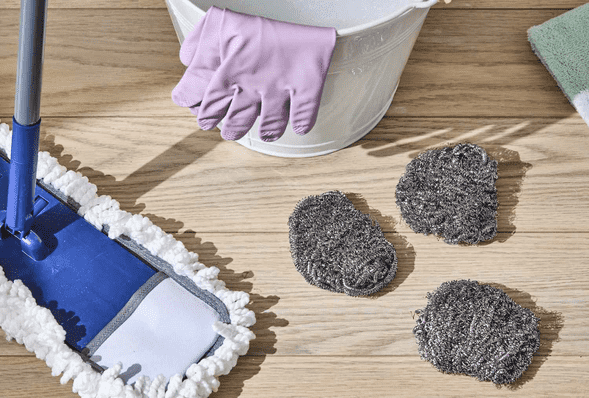
Using Natural and Non-Toxic Ingredients
Natural does not automatically mean safe. Essential oils, while natural, cause allergic reactions in some people. Vinegar, though non-toxic, damages certain floor finishes. Evaluate each ingredient individually.
Truly safe cleaning ingredients for hardwood floors:
- Plant-based surfactants: Derived from coconut or corn, these clean effectively without harsh chemicals
- Purified water: The safest base for any cleaning solution
- Food-grade citric acid: Gentle natural cleaner replacing harsher acids
- Vegetable glycerin: Natural moisturizer, preventing wood from drying out
- Soy-based solvents: Break down sticky residues without petroleum derivatives
Ingredients to avoid regardless of DIY or commercial source:
- Ammonia: Dulls finishes and releases harmful fumes
- Bleach: Discolors wood and destroys finish integrity
- Straight vinegar or lemon juice: Too acidic for protective coatings
- Wax-based products: Create buildup requiring professional removal
- Steam or excessive water: Warps wood and lifts finishes
Commercial cleaners marketed as natural or green should list all ingredients. Avoid products using vague terms like “naturally derived” or “plant-based formula” without specific ingredient disclosure.
Here’s something that might surprise you about eco-friendly cleaners: many commercial hardwood cleaners labeled eco-friendly contain only 25 to 50% plant-based ingredients. The remainder consists of synthetic chemicals not disclosed on labels.
Disposing of Cleaning Solutions Responsibly
Most hardwood floor cleaners, both DIY and commercial, can be safely disposed of down household drains connected to municipal wastewater treatment systems. However, some considerations apply.
Safe disposal practices:
- Dilute concentrated cleaners before pouring them down drains to reduce treatment plant burden
- Never dump large quantities at once. Spread disposal over several drain uses
- Check local regulations for specific restrictions on surfactants or solvents
- Avoid dumping outdoors where runoff enters storm drains, flowing directly to waterways
- Recycle empty bottles through municipal recycling programs accepting plastic types 1 and 2
Commercial cleaners containing specialized chemicals sometimes require hazardous waste disposal. Check product labels for disposal instructions. Most residential hardwood cleaners do not fall into this category.
DIY cleaners using vinegar, dish soap, and essential oils pose minimal environmental concerns when disposed of through wastewater systems. These ingredients break down quickly in treatment processes.
Cost and Value Analysis
DIY hardwood cleaners cost $0.02 to $0.10 per cleaning session, while store-bought products run $0.25 to $0.75 per use. However, the total value includes effectiveness, convenience, and floor protection beyond raw material costs.
Understanding true cost per use requires calculating all expenses, including ingredients, storage containers, time spent mixing, and potential finish damage from improper formulations.
Average Cost Per Use Comparison
DIY cleaner costs for 1,000 sq ft. Floor:
Basic vinegar solution (1-gallon batch):
- White vinegar: $0.25
- Water: $0.01
- Essential oil: $0.15
- Total per batch: $0.41
- Cost per use (500 sq ft): $0.02
Enhanced DIY formula (1-gallon batch):
- Water: $0.01
- Vinegar: $0.25
- Dish soap: $0.10
- Essential oil: $0.20
- Rubbing alcohol: $0.15
- Total per batch: $0.71
- Cost per use (500 sq ft): $0.04
Store-bought cleaner costs for a 1,000 square foot floor:
Budget commercial cleaner (ready to use):
- Product cost: $8.00 per 32-ounce bottle
- Coverage: 600 square feet per bottle
- Cost per use (500 sq ft): $0.28
Premium commercial cleaner (concentrated):
- Product cost: $15.00 per 32-ounce bottle
- Dilution ratio: 1:10 (makes 320 ounces)
- Coverage: 3,200 square feet total
- Cost per use (500 sq ft): $0.12
Mid-range commercial cleaner (ready to use):
- Product cost: $12.00 per 32-ounce bottle
- Coverage: 400 square feet per bottle
- Cost per use (500 sq ft): $0.38
Looking to save even more on commercial cleaners? Buy concentrated formulas instead of ready-to-use versions. These cost 40 to 60% less per use than ready-to-use versions while reducing packaging waste. One concentrated bottle replaces five to ten ready-to-use bottles.
Longevity and Shelf Life
DIY cleaners last 2 to 4 weeks before ingredients separate or lose potency. Store in cool, dark locations and shake well before each use. Vinegar-based solutions remain stable the longest, while oil-based formulas separate quickly.
Signs your DIY cleaner has expired:
- Visible separation that doesn’t remix with shaking
- Cloudy appearance in previously clear solutions
- Unpleasant or rancid odors
- Reduced cleaning effectiveness
- Mold or bacterial growth in a storage container
Commercial cleaners remain effective 1 to 3 years unopened. Most contain preservatives preventing bacterial growth and stabilizers keeping ingredients suspended. Check expiration dates printed on bottles.
Once opened, commercial cleaners maintain quality for 6 to 12 months. Exposure to air, temperature fluctuations, and contamination from dirty mop heads gradually reduces effectiveness.
Concentrated commercial formulas offer the best value long term. One bottle lasts 6 to 12 months, even with weekly use. Ready-to-use products require replacement every 4 to 8 weeks, depending on floor size and cleaning frequency.
Mistakes to Avoid With Hardwood Floor Cleaners
Common cleaning mistakes damage hardwood floors regardless of whether you use DIY or commercial products. Understanding these pitfalls prevents costly repairs and maintains floor beauty.
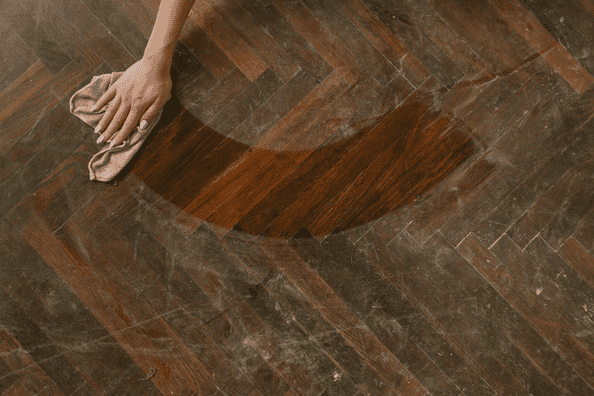
Using Too Much Product
More cleaning does not mean cleaner floors. Excess product leaves residue, attracting dirt and creating dull, sticky surfaces. This applies equally to DIY and commercial formulas.
Use cleaners sparingly. Most floors need only light misting or damp mopping. The goal is barely damp, not wet. If you can see standing liquid or footprints after mopping, you are using too much.
Proper application techniques:
- Spray directly on the microfiber mop head rather than the floor
- Wring mops until nearly dry before use
- Use 2 to 3 sprays per 10 square feet maximum
- Buff dry with a clean microfiber cloth immediately after cleaning
Wrong pH Levels
Hardwood flooring finishes tolerate only narrow pH ranges. Acidic cleaners (pH below 6) gradually etch and dull polyurethane. Alkaline cleaners (pH above 8) break down oil-based finishes and penetrate wood fibers.
Test your DIY cleaner pH using inexpensive test strips from pool supply stores. Adjust formulations to achieve 6.5 to 7.5 pH for the safest cleaning.
Commercial cleaners should clearly state pH-neutral or pH-balanced on labels. Avoid products listing only “safe for hardwood” without specific pH information.
Excessive Moisture
Water is hardwood’s enemy. Excessive moisture during cleaning causes:
- Edge swelling and cupping
- Finish cloudiness and hazing
- Mold growth between planks
- Adhesive failure in engineered flooring
- Accelerated finish degradation
Never pour cleaner directly on floors. Never use soaking wet mops. Never allow puddles to sit on surfaces. Always dry floors immediately after cleaning with clean, dry microfiber cloths.
Using Steam Mops or Steam Cleaners
Steam cleaning seems appealing for chemical-free sanitization. However, steam mops force moisture and heat into wood floors, causing irreversible damage.
Problems caused by steam cleaning hardwood:
- Moisture penetrates between planks, swelling the wood
- Heat softens and clouds polyurethane finishes
- Trapped moisture promotes mold growth
- Warranty violations on most hardwood products
- Accelerated finish breakdown requiring earlier refinishing
Never use steam mops, steam cleaners, or wet vacuum systems on hardwood floors, regardless of manufacturer claims about hardwood compatibility.
What causes most hardwood floor damage, blamed on cleaners? Most hardwood floor damage attributed to product choice actually results from using too much moisture during cleaning, regardless of whether the cleaner is DIY or commercial.
Mixing Incompatible Products
Combining different cleaners creates unpredictable chemical reactions. Never mix commercial products together. Never add DIY ingredients to commercial cleaners, attempting to enhance performance.
Dangerous combinations include:
- Vinegar plus hydrogen peroxide creates peracetic acid, causing respiratory irritation
- Ammonia-based cleaner plus vinegar releases toxic fumes
- Bleach plus any acid releases chlorine gas
- Multiple commercial products may react, creating harmful compounds
Use one cleaner at a time. Rinse floors thoroughly between switching products. Wait at least 24 hours before trying a different cleaner.
Here’s a simple habit that prevents repeated mistakes: keep a cleaning log noting which products you use and results achieved. This helps identify what works best for your specific floors while avoiding repeating past mistakes.
Which One Is Right For You?
Choose DIY cleaners if you prioritize cost savings, enjoy customizing formulas, clean frequently, and have newer floors with durable finishes.
Choose store-bought cleaners if you value convenience, have older floors needing extra protection, face tough cleaning challenges, or want guaranteed pH-balanced formulas.
Most households benefit from both approaches. Use DIY solutions for weekly maintenance and commercial products for monthly deep cleaning or addressing specific problems. This hybrid strategy maximizes savings while ensuring thorough cleaning when needed.
Consider these factors when making your decision:
Choose DIY when:
- Budget is the primary concern
- You clean frequently (2+ times weekly)
- Floors are new with a factory finish in excellent condition
- You enjoy making custom cleaning solutions
- Soil levels remain light to moderate
- You have time for mixing and testing formulas
Choose commercial when:
- Convenience outweighs cost savings
- Floors are older or show finish wear
- You face tough stains or heavy traffic areas
- Peace of mind about pH balance matters
- You clean infrequently (monthly or less)
- You need specialized formulas for specific finish types
Takeaway
Both DIY and store-bought hardwood cleaners effectively maintain floors when used correctly. DIY solutions save money and reduce chemical exposure but require careful formulation to avoid finish damage. Commercial products provide convenience, guaranteed pH balance, and specialized formulas for specific challenges.
Rustic Wood Floor Supply stocks carefully selected hardwood floor cleaning products that actually work. Every product meets our strict standards for performance, safety, and value. Our team consists of hardwood flooring professionals who install, maintain, and refinish hardwood floors. We recommend only products we trust on our own floors and our clients’ floors.
Get in touch with our team at Rustic Wood Floor Supply for expert guidance, quality products, and reliable support. We will help you protect your hardwood investment while keeping floors beautiful for years to come.
Talk to Experts: (678) 691-0533
Frequently Asked Questions
Are homemade hardwood cleaners as effective as store-bought brands?
Homemade cleaners work well for routine maintenance and light soil on newer floors. Commercial products outperform DIY solutions for heavy soil, tough stains, and protecting older finishes through specialized pH-balanced formulas and professional surfactant systems.
Is it safe to use vinegar or dish soap on all hardwood floors?
No. Vinegar’s acidity degrades polyurethane coatings while dish soap leaves dulling residue. If using these ingredients, dilute heavily (1 part vinegar to 10 parts water minimum), test first, and rinse thoroughly to minimize damage.
What ingredients in commercial wood floor cleaners should be avoided?
Avoid ammonia, bleach, undisclosed fragrances, petroleum distillates, wax, and silicone. These dull finishes leave residue, release harmful fumes, or create buildup. Choose pH-neutral, residue-free formulas with plant-based ingredients and safety certifications.
Which store-bought hardwood floor cleaner is best for homes with pets or allergies?
Bona Hardwood Floor Cleaner and Method Squirt + Mop are top-rated for pet and allergy safety. Both feature plant-based ingredients, Greenguard Gold certifications, pH-neutral formulas, and residue-free cleaning without harsh chemicals or allergens.
Author Profile
- I have worked in hardwood flooring for the last 8 years. Use to run a company of residential crews as well as a company with gym flooring. If you need floor installation or refinishing help, I should have an answer or at least get you in the right direction.
Latest entries
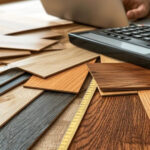 FlooringJanuary 15, 2026Does New Hardwood Flooring Increase Your Home Value?
FlooringJanuary 15, 2026Does New Hardwood Flooring Increase Your Home Value?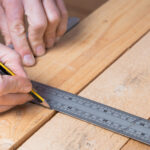 FlooringJanuary 14, 2026Can You Refinish Engineered Hardwood?
FlooringJanuary 14, 2026Can You Refinish Engineered Hardwood?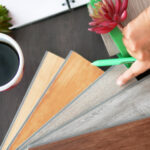 FlooringJanuary 10, 2026What Wood Floor Color Do I Choose?
FlooringJanuary 10, 2026What Wood Floor Color Do I Choose?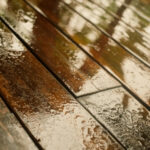 FlooringJanuary 9, 2026How To Prevent Hardwood Floor Moisture Problems?
FlooringJanuary 9, 2026How To Prevent Hardwood Floor Moisture Problems?

